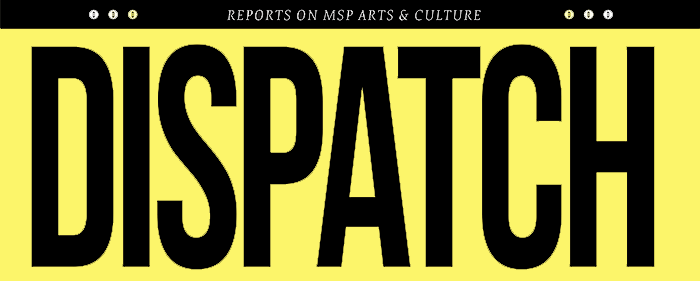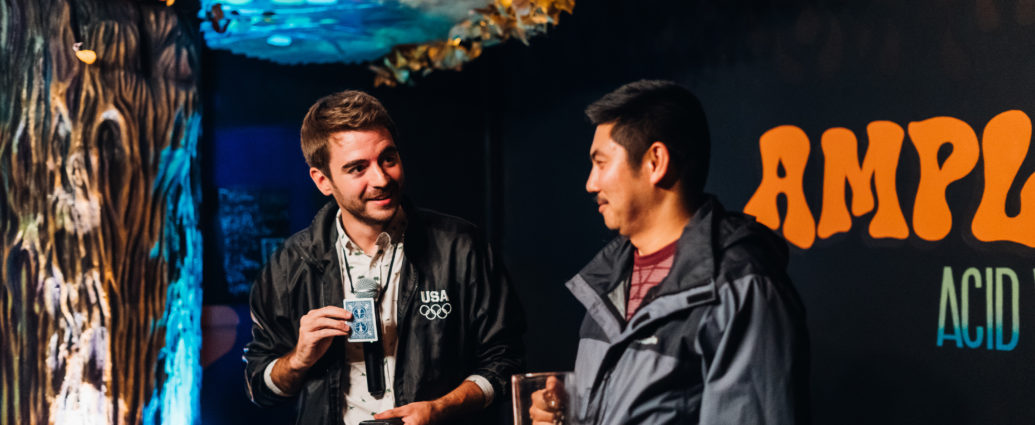How Twin Cities magicians made a community appear seemingly out of thin air.
WORDS BY PATRICK STRAIT
It’s the third Tuesday of the month inside the comedy room at Sisyphus Brewing, and a crowd of roughly 40 curious audience members’ attention is focused on magician Noah Sonie. While the room is typically booming with laughs from local and touring comedians, once a month it becomes a workshop for magicians looking to perfect their craft or attempt new tricks during the Magicians’ Open Mic.
Clad in jeans with braids pulled back into a messy bun, Sonie is on stage making casual conversation with the audience about an ex-girlfriend who left him for a turtle farmer. Meanwhile, a volunteer is hastily shuffling a deck of cards at Sonie’s request, while another volunteer holds on to a second deck in the front row. After cracking a few jokes, Sonie begins to flip the cards in the deck one at a time. They appear to be in completely random order, which isn’t all that surprising to the audience. However, when Sonie grabs the second deck of cards from his other volunteer, he reveals that somehow the deck is in the same random order. The crowd lets out a collective gasp as Sonie thanks his assistant and makes his way offstage to watch the rest of the show.
While it is easy to find live music, theater, and comedy in the Twin Cities any night of the week, the local magic scene can be slightly more…mysterious.
“I think we’re the only regularly performing magic show in town,” says Eli Sanchez, one-third of The Magic Underground, along with Sonie and fellow magician Chris Leuck. “The purpose of our group is to show people a different type of magic than they may be used to seeing.”
Today, the group puts together multiple shows each month around town, captivating curious audiences while giving the next generation of magicians a roadmap to pursue their passion. But the local magic comedy scene—or lack thereof—goes back to before the new generation of performers were even born.
Paving the way
Suzanne can’t quite recall how she got into magic in the first place.
After moving to Minnesota in 1984 to be a computer programmer, she dated a musician and often found herself alone while he was pursuing his art. Then, the magic found her.
“I don’t necessarily believe in destiny or that kind of stuff, but through a wild synchronicity kind of thing I was introduced to a local magic club,” says the magician, who uses only a mononym. “I met this guy who was a sleight-of-hand technician and started learning from him.”
Soon, she was performing tableside at local restaurants in town, such as the Ground Round. A year later, she quit her job as a programmer to pursue magic full-time.
Over the next four decades, Suzanne performed in all the most prestigious magic clubs in the country, appeared on television with legendary magicians Penn & Teller, and was even named “Close Up Magician of the Year” by The Academy of Magical Arts. But finding a community locally wasn’t as easy as saying “hocus pocus.”
“I didn’t see a lot of magic locally,” she says. “It was kind of a geeky hobby thing. On some level, it still is.”
Despite the lack of camaraderie, Suzanne found a mentor in seasoned magician Al Schneider, who helped her develop her craft.
“I was enamored with close-up magic,” she says. “I loved the idea of doing a little show for people sitting at a table.”
While she took to the mechanics of magic very quickly, Suzanne admits that the performance aspect came more slowly.
“I’m an introvert, so I had to practice going up to tables and making conversation and not curling up in a little ball,” she says, laughing. But once she began to apply her programmer mindset and think of audience interaction in a practical, if-then type of scenario, Suzanne says she found her flow.
“You have to experience it,” she says of the social piece of performing magic. “You can’t read about it and learn it. You have to get out there and do it. Once I figured out how to read the audience, I realized that there were only so many responses someone can give you in a specific situation. So my interactions became kind of stock, in a way.”
Over time, Suzanne would go from student to teacher, mentoring other young magicians, and producing her own how-to tutorials to help others learn the art the same way as she did years ago. However, at 61, Suzanne realizes that the audience is more skeptical than they were when she was starting out.
“There’s more YouTube magic today, so people will watch you and then say, ‘Oh my god, I’m going to do a search and see if I can figure out how you’re doing that.’ So that’s when you bring them in and say, ‘OK, let’s do the trick again,’ and then do it completely different. Of course, you still get those certain personality types where the guy can’t figure it out so he just puffs out his chest and says, ‘Pfff, sleight of hand.’”
These days, Suzanne is still active in the community, performing regularly for guests at Birch’s on the Lake, Lord Fletcher’s, and Rockwoods. She also writes about magic for various publications and appears at corporate events, though for her the motivation continues to be less about recognition, and more about the art form.
“This sounds so goofy, but it’s about the journey, not the destination,” she says. “It’s never been about where we’re going. It’s about how we get there.”
No more top hats and tuxedos
While they call themselves The Magic Underground, the three-magician collective got connected in the most formal way possible.
“There’s a group called the International Brotherhood of Magicians, or IBM,” says Sanchez. “It’s kind of like a Toastmasters for magicians. That’s where I met Chris and Noah.”
The organization has a long history, dating back more than 100 years. Today, there are members in 88 countries who use the brotherhood for connection, networking, and education. But for Sanchez, Sonie, and Leuck, the group wasn’t quite their speed (or age).
“It was all old heads,” Sanchez continues. “It’s very important and you’re going to meet a lot of really good people, but like a lot of organizations that have been around that long, it can be very slow and bureaucratic.”
Adds Leuck, “It’s kind of a place where if you’re our age, you come in, find your group of people you want to hang out with, and then you don’t really come back.”
The trio, all in their 20s, first got the idea to put on their own shows in 2018. At the time, Theatre in the Round was hosting a weekly Sunday night magic show (which was co-founded by Suzanne). The show was slick and polished, but still had a lot of elements of a more traditional magic show that the three friends didn’t quite identify with.
“I approached Chris and Noah and said I think we have something that the Sunday night show doesn’t have,” recalls Sanchez. “We have sort of a youthful spirit. The Sunday show was a lot of what you would expect from a magic show, with suits and stuff like that.”
Together, the three young magicians began hosting their own shows as The Magic Underground, popping up around the Twin Cities, from the Comedy Corner Underground to Camp Bar to the Green Lantern.
“Before those shows we were doing magic together in college,” explains Sonie. “Chris and I went to college together, and we would, like, open for comedians or do shows in breakout rooms on campus. Really, anywhere we could.”
“After that, restaurants kind of became the spot,” says Leuck. “People would hire magicians for events, but there weren’t a lot of places to buy a ticket for an actual magic show.”
The group changed that, and slowly began to build an audience over the next two years. When the pandemic hit, they collectively decided they didn’t want to perform virtually, and would take the time to refine their skills.
“It just didn’t really fit with what we were trying to do,” says Sonie. “We wanted to bring magic to all of these crazy places.”
In 2021, the group began holding shows again and hasn’t looked back since.
Despite being close friends and co-conspirators in the magic world, all three members of the Underground are very unique when it comes to their presentation style and future plans.
Sonie, for example, is a full-time magician by trade, performing shows all over the country at magic clubs, colleges, and corporate events. Leuck says he prefers the creation process of magic over the performance aspect, and hopes to someday sell ideas to other magicians and watch them perform his tricks. And Sanchez? He’s just having a good time.
“I don’t want to be a professional magician,” he says. “I wanted it for a time, and realized that I can’t. I’m not working to make it a career. I like it as a hobby and plan to treat it that way.”
No matter where they choose to take their magic, collectively or as individuals, all three agree the continued success of magic in the Twin Cities is based more on friendship than it is the art.
“There’s a strong sense of friendship and community here,” says Sonie. “The IBM and older magicians built this early sense of community and we’ve expanded on it. There’s always been a push for magic here and to keep it alive. That’s something that we’re really passionate about too.”
The next wave of trick slingers
Over the past several years, some incredibly notable names in the global magic community have come from Minnesota. Minnesota-born magicians like Derek Hughes and Dan Sperry have helped to attract new fans along with a younger generation of would-be magicians looking to find their voice (or whatever else may be up their sleeve).
At the most recent open mic, a high school student named Sleven Olson demonstrated his mentalist abilities on stage at Sisyphus, while most of his peers were likely at home being hypnotized by the almighty TikTok algorithm.
“I think people like Sleven are starting to see that we have these spaces and want to pursue that,” says Sanchez. “It blows my mind when I see someone who comes to a show and doesn’t already know someone. Like they just know we’re the guys who do magic in town.”
Similarly, Leuck shares a story about meeting a new magician in town from the Philippines who found the group while scouring Instagram for like-minded magical pals.
“It was cool because our friend Trevor [Almonia] moved here from the Philippines, where he had been doing magic already, and he tracked us down,” Leuck recalls. “He didn’t need us to show him anything, but he wanted to connect with other magicians. We’ve kind of become that hub for magicians.”
Adds Sanchez, “That was the first time I was like, people are finding us because they want to learn about magic or just find something out. That’s a really cool feeling.”

